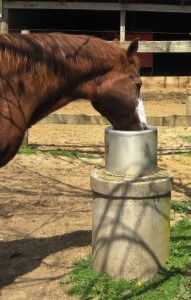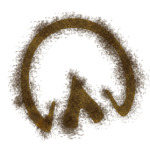
Do your parents like to wake up to a hot cup of coffee in the morning? Since horses don’t drink coffee (that would be downright silly!) the first thing I do after I open my eyes to the morning sun is head over to my waterer and get a nice cool drink. But as I was going through my daily routine the other morning, I realized something wasn’t quite right…my liquid sustenance was missing! So I started searching for it. I pushed my waterer around with my nose to see if maybe it was underneath, but when I realized there was no way to move the waterer around on my own, I had to bring in some backup. I saw one of my caretakers nearby and yelled, “Hey, can you help me move this thing? I think my water is trapped underneath!” (or at least that’s what it seemed like to me and the other horses!) I don’t think the caretaker understood what I was saying, but I got her attention nonetheless. Thanks to a little handy work on the well pump, the bowl was filled to the brim with sparkling clean water which I slurped up like a dry sponge! With my thirst quenched, I continued on with my day as usual (mostly eating and napping), but I’ll never forget how nervous I was at the thought of not having water to drink!
As much as I look forward to my refreshing fill of H2O in the morning, some horses aren’t as enthusiastic about hydration as yours truly. Often times external factors such as temperature, weather conditions, and stress as a result of changes in the environment or workload can affect a horse’s drinking regimen. These factors, combined with the threat of automatic waterer malfunctions, can make it difficult for a horse to maintain proper hydration. For this reason, it is imperative that horses have access to fresh, clean water at all times and behavioral changes be addressed as soon as they are recognized. In the worst cases, dehydration can impair normal gut function, cause impaction colic, “tying up”, and other health issues.
By keeping a close eye on the horse’s water source, and getting to know what is “normal” in terms of water consumption are both good ways to encourage proper hydration. For a horse with a drinking problem (wink, wink), applesauce, corn syrup, molasses, and electrolytes are all useful for stimulating thirst. (Do you remember how much water horses consume daily on average? Check out this blogpost to be reminded!)
In the winter months, horses may be reluctant to drink if their water source is freezing cold, so water heaters may be useful for not only making the water a comfortable temperature for consumption, but also preventing ice from forming on the troughs and buckets. These can be dangerous if not installed correctly or in the case of a malfunction, so it is extremely important that they are checked on a daily basis. My friends at the Equine Science Center know all about how to maintain water supply in winter months – they wrote a factsheet about it!
That’s all for now folks, all this talk about water is making me thirsty! Stay warm (and hydrated)!

